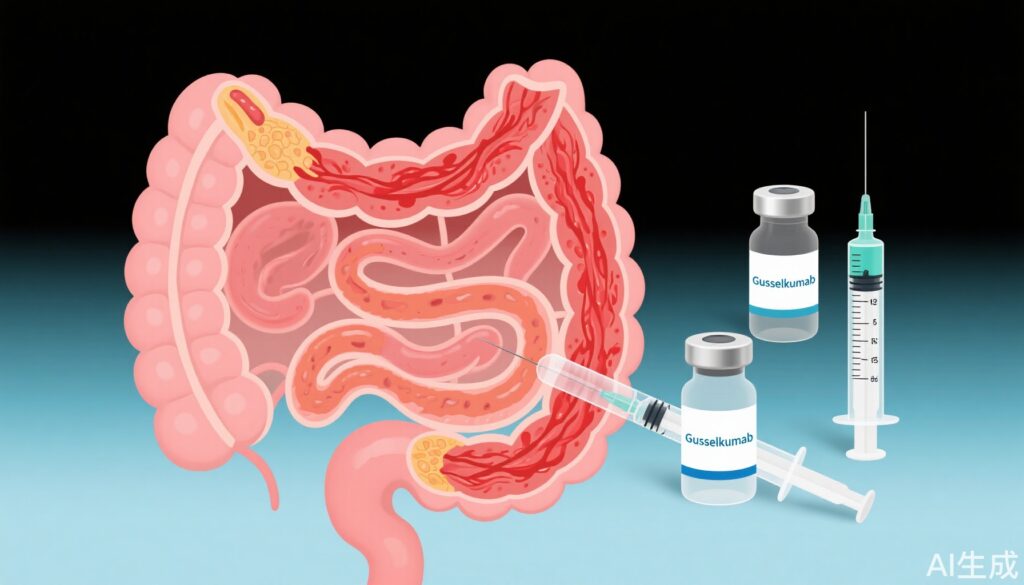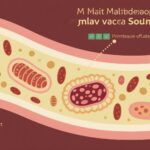Highlights
- Guselkumab demonstrates significant efficacy over placebo and active comparator in both induction and maintenance therapy for moderate-to-severe Crohn’s disease and ulcerative colitis.
- Efficacy is consistent across intravenous induction and subcutaneous maintenance regimens.
- Safety profiles are favorable and consistent with previous indications, with low serious adverse event rates.
Clinical Background and Disease Burden
Crohn’s disease (CD) and ulcerative colitis (UC) are chronic, relapsing-remitting inflammatory bowel diseases (IBDs) that impose significant morbidity, impaired quality of life, and healthcare costs. Despite advances in biological therapies, a substantial proportion of patients with moderate-to-severe IBD experience suboptimal disease control, treatment intolerance, or loss of response. Thus, there is a critical unmet need for new, effective, and safe therapeutic options.
Research Methodology
Three pivotal phase 3, randomized, double-blind, placebo-controlled studies (GALAXI-2, GALAXI-3, and GRAVITI for CD; QUASAR for UC) assessed the efficacy and safety of guselkumab, an anti-IL-23 monoclonal antibody, in adults with moderate-to-severe IBD.
In GALAXI-2 and GALAXI-3, 1048 adults with moderate-to-severe CD were randomized (2:2:2:1) to:
– Guselkumab 200 mg IV at weeks 0, 4, 8, then 200 mg SC every 4 weeks (Q4W)
– Guselkumab 200 mg IV at weeks 0, 4, 8, then 100 mg SC every 8 weeks (Q8W)
– Ustekinumab IV induction/SC maintenance (active comparator)
– Placebo
The GRAVITI study randomized 347 adults to:
– Guselkumab 400 mg SC Q4W induction, then 100 mg SC Q8W maintenance
– Guselkumab 400 mg SC Q4W induction, then 200 mg SC Q4W maintenance
– Placebo
QUASAR enrolled 701 adults with moderate-to-severe UC for induction (guselkumab 200 mg IV or placebo), followed by 568 responders entering maintenance (guselkumab 200 mg SC Q4W, 100 mg SC Q8W, or placebo).
Primary endpoints included clinical response/remission and endoscopic response/remission at specified timepoints (weeks 12, 24, and 48).
Key Findings
Crohn’s Disease (GALAXI-2, GALAXI-3, GRAVITI):
– In GALAXI-2 and GALAXI-3, both guselkumab regimens were superior to placebo for clinical response at week 12 and clinical remission at week 48 (GALAXI-2: 55% and 49% vs 12% [placebo]; adjusted difference 43% and 38%; p<0.0001).
– Endoscopic response at week 48 was significantly higher in guselkumab groups (GALAXI-2: 38-39% vs 5% [placebo]; GALAXI-3: 34-36% vs 6% [placebo]; all p<0.0001).
– Serious adverse events were less frequent in the guselkumab 200 mg group (7%) compared to placebo (15%) and ustekinumab (12%). No deaths were reported.
– In GRAVITI, at week 12, clinical remission was achieved in 56.1% (guselkumab 400 mg) vs 21.4% (placebo; Δ=34.9%; p<0.001). At week 48, clinical remission rates were 60.0% (100 mg Q8W) and 66.1% (200 mg Q4W) vs 17.1% (placebo; both p<0.001). Endoscopic response rates at week 48 were also significantly higher in guselkumab arms (44.3–51.3% vs 6.8%).
– Efficacy was consistent in both biologic-naïve and biologic-experienced patients.
– Adverse event rates were comparable between guselkumab and placebo.
Ulcerative Colitis (QUASAR):
– At induction week 12, clinical remission was achieved in 23% of guselkumab-treated vs 8% of placebo-treated patients (adjusted difference 15%, 95% CI 10–20; p<0.0001).
– At maintenance week 44, remission rates were 50% (200 mg Q4W) and 45% (100 mg Q8W) vs 19% (placebo; adjusted difference 30% and 25%, respectively; both p<0.0001).
– Safety profiles were favorable, with similar adverse event rates across treatment and placebo groups. No new safety signals were observed.
Mechanistic Insights
Guselkumab selectively targets the p19 subunit of interleukin-23 (IL-23), a cytokine implicated in the pathogenesis of IBD through modulation of T-helper 17 (Th17) cell function and mucosal inflammation. This targeted inhibition is hypothesized to yield clinical and endoscopic improvements, as demonstrated in the above trials.
Expert Commentary
Leading IBD experts highlight the significance of these results, noting that guselkumab offers a much-needed, effective, and well-tolerated alternative for patients with refractory or inadequately controlled IBD. Its benefit in both anti-TNF-experienced and naïve populations supports its broad applicability in clinical practice.
Controversies or Limitations
– While results are robust, longer-term data beyond 48 weeks are needed to establish sustained efficacy and safety.
– Subgroup analyses by prior biologic failure, concomitant immunosuppressive use, and extraintestinal manifestations were limited.
– The comparison with ustekinumab, though valuable, does not address head-to-head performance with other new IL-23 or JAK inhibitors.
Conclusion
Guselkumab, administered via intravenous or subcutaneous routes, is a highly effective and safe option for induction and maintenance of remission in moderate-to-severe Crohn’s disease and ulcerative colitis. These data support its integration into therapeutic algorithms for IBD, pending further long-term real-world evidence and comparative studies.
References
Panaccione R, Feagan BG, Afzali A, Rubin DT, Reinisch W, Panés J, Danese S, Hisamatsu T, Terry NA, Salese L, Van Rampelbergh R, Sahoo A, Vetter ML, Yee J, Han C, Frustaci ME, Wan KYY, Yang Z, Johanns J, Andrews JM, D’Haens GR, Sands BE; GALAXI 2 & 3 Study Group. Efficacy and safety of intravenous induction and subcutaneous maintenance therapy with guselkumab for patients with Crohn’s disease (GALAXI-2 and GALAXI-3): 48-week results from two phase 3, randomised, placebo and active comparator-controlled, double-blind, triple-dummy trials. Lancet. 2025 Jul 26;406(10501):358-375.
Hart A, Panaccione R, Steinwurz F, Danese S, Hisamatsu T, Cao Q, Ritter T, Seidler U, Olurinde M, Vetter ML, Yee J, Yang Z, Wang Y, Johanns J, Han C, Sahoo A, Terry NA, Sands BE, D’Haens G; GRAVITI Study Group. Efficacy and Safety of Guselkumab Subcutaneous Induction and Maintenance in Participants With Moderately to Severely Active Crohn’s Disease: Results From the Phase 3 GRAVITI Study. Gastroenterology. 2025 Aug;169(2):308-325.
Rubin DT, Allegretti JR, Panés J, Shipitofsky N, Yarandi SS, Huang KG, Germinaro M, Wilson R, Zhang H, Johanns J, Feagan BG, Hisamatsu T, Lichtenstein GR, Bressler B, Peyrin-Biroulet L, Sands BE, Dignass A; QUASAR Study Group. Guselkumab in patients with moderately to severely active ulcerative colitis (QUASAR): phase 3 double-blind, randomised, placebo-controlled induction and maintenance studies. Lancet. 2025 Jan 4;405(10472):33-49.



